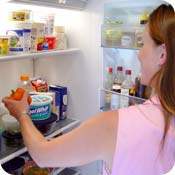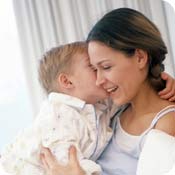 And that means whooping cough, even in 2010, is a dangerous illness for the most vulnerable children. Babies younger than six months--too young to be fully immunized against the highly contagious illness--made up 89 percent of California's cases. Less than 20 percent of the people who reported having whooping cough were hospitalized, however, more than half of those severe cases were in infants younger than 3 months.
And that means whooping cough, even in 2010, is a dangerous illness for the most vulnerable children. Babies younger than six months--too young to be fully immunized against the highly contagious illness--made up 89 percent of California's cases. Less than 20 percent of the people who reported having whooping cough were hospitalized, however, more than half of those severe cases were in infants younger than 3 months.
Still, health officials say vaccination is the best protection against whooping cough--that and plain, old good hygiene. Cover coughs and sneezes, avoid people who are ill, wash your hands frequently and thoroughly.
And if a cough lasts more than a week, get to a doctor. Antibiotics can kill off the bacteria--stopping contagion--even if the cough persists.
|
What is whooping cough?
Known as pertussis, the highly contagious bacterial illness attacks the upper respiratory system and cause swelling that can take weeks to heal. A persistent cough is the tell-tale symptom, though in the first one to two weeks of illness, whooping cough can seem like a common cold. |
Who is most at risk?
Infants and young children who have not received full immunization against the pertussis, as well as pregnant women and other people who have compromised immune systems. |
What is the vaccine?
The pertussis vaccine usually is given in the combination dTap vaccine--it's the "p"--that is recommended to be given when kids are 2, 4 and 6 months old, between 15 and 18 months old, and finally when they enter school. |
What other prevention is there?
- Avoid people who are sick, especially if you have a young infant.
- Practice good hygiene.
- Wash hands frequently and thoroughly with soap and water, singing the ABCs all the way through while you wash.
- Cover coughs and sneezes.
|
What if I think my child has whooping cough?
Check with your doctor. Tests, such as a nasal swab, can detect the illness.
|
|
 And that means whooping cough, even in 2010, is a dangerous illness for the most vulnerable children. Babies younger than six months--too young to be fully immunized against the highly contagious illness--made up 89 percent of California's cases. Less than 20 percent of the people who reported having whooping cough were hospitalized, however, more than half of those severe cases were in infants younger than 3 months.
And that means whooping cough, even in 2010, is a dangerous illness for the most vulnerable children. Babies younger than six months--too young to be fully immunized against the highly contagious illness--made up 89 percent of California's cases. Less than 20 percent of the people who reported having whooping cough were hospitalized, however, more than half of those severe cases were in infants younger than 3 months. 





Member Comments